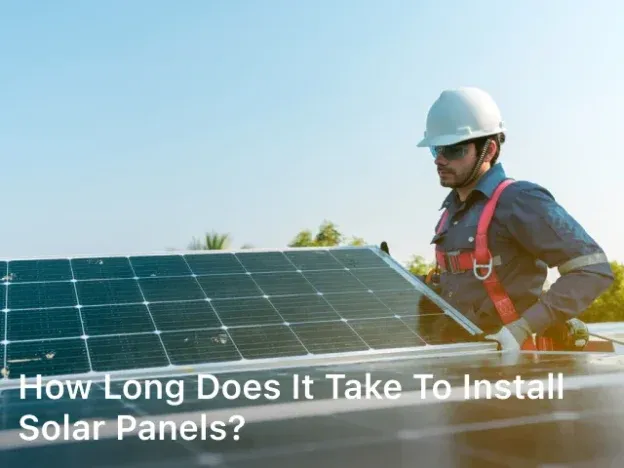How Long Does it Take to Install Solar Panels? Discover the detailed process of solar panel installation, including timeframes, FAQs, and expert insights. Learn everything about “How Long Does it Take to Install Solar Panels?” Installing solar panels is a smart choice for both the environment and your wallet. However, one common question that arises is, “How long does it take to install solar panels?” In this comprehensive guide, we will break down the entire process, step by step, and provide you with a clear understanding of what to expect. Let’s shed some light on the timeline of solar panel installation. The Solar Panel Installation Process Site Assessment and Planning Before diving into the installation process, a thorough site assessment and planning stage are crucial. This involves evaluating your property’s suitability, including factors like roof condition, shading, and orientation. An experienced solar installer will conduct these assessments, ensuring the solar panels are optimally placed. Design and Permitting Once the assessment is complete, the next step is designing your solar panel system. This design considers your energy needs, available space, and system components. After finalizing the design, the installer will obtain the necessary permits from local authorities, which can take a few weeks. Material Procurement To ensure a smooth installation, all required materials, including solar panels, inverters, and mounting hardware, need to be procured. This process generally takes one to two weeks, depending on product availability. Installation Day The actual installation day is when the solar panels are mounted on your roof or property. This step typically takes one to three days, depending on the system’s complexity and the size of your installation crew. Electrical and Grid Connection After the panels are installed, the electrical components are connected, and the system is integrated into the grid. This step may take up to two days, as it involves electrical work and inspections. Testing and Commissioning Once everything is connected, the system undergoes rigorous testing to ensure it functions optimally. This may require another day or two to complete. How Long Does it Take to Install Solar Panels? In total, the installation process can range from a few weeks to a couple of months. However, it’s important to note that these timeframes can vary based on several factors, including the complexity of your installation and local permitting regulations. To get a precise estimate, consult with your chosen solar installer. What to expect after installing solar panels? After installing solar panels on your property, there are several things you can expect in terms of benefits, responsibilities, and considerations: Reduced Electricity Bills One of the most significant benefits of solar panel installation is a reduction in your electricity bills. Solar panels generate electricity from sunlight, which can offset a significant portion of your energy consumption. You may even produce surplus electricity that can be credited or sold back to your utility company, further reducing your bills. Return on Investment (ROI) Over time, your solar panels can pay for themselves through energy savings and potential financial incentives. Depending on your location and the size of your solar installation, you can expect to see a return on your investment within several years. Environmental Benefits Solar panels are a clean and renewable energy source, which means you’ll be reducing your carbon footprint and contributing to a more sustainable future. Using solar energy helps decrease greenhouse gas emissions and lessens your reliance on fossil fuels. Tax Credits and Incentives Many regions offer tax credits, rebates, or incentives for solar panel installations. These financial incentives can help offset the upfront cost of your solar system, improving your ROI. Net Metering If your area has net metering policies, you can expect to take advantage of them. Net metering allows you to send excess electricity generated by your solar panels back to the grid, earning credits on your utility bill. This can further reduce your energy costs. Maintenance Solar panels generally require minimal maintenance. Regular cleaning to remove dust and debris and occasional inspections are usually sufficient to keep your system running efficiently. Inverter replacements may be needed over the life of the system, but these are relatively straightforward. Increased Home Value Solar panels can increase the resale value of your property. Many homebuyers appreciate the lower energy bills and eco-friendly aspects of a solar-powered home. Energy Independence By generating your electricity, you become less reliant on external energy sources, reducing your vulnerability to rising energy costs and potential power outages. Longevity Solar panels have a long lifespan, often lasting 25 years or more. Many manufacturers offer warranties to ensure the performance and durability of their panels. System Monitoring Modern solar installations often include monitoring systems that allow you to track energy production and system performance. This data can help you optimize your energy usage and identify any issues with your solar system. Local Regulations Be aware of any local regulations or requirements related to solar panel installations. This may include periodic inspections or compliance with specific building codes. Insurance and Homeowners Association (HOA) Approval Check with your insurance provider to ensure your solar panels are adequately covered. If you live in a community with an HOA, you may need their approval for the installation. Upkeep of Trees and Shade If you have trees near your solar panels, you may need to trim branches to prevent shading, which can reduce panel efficiency. Energy Consumption Changes Monitor your energy consumption patterns. As you generate more of your electricity from solar panels, you might find it tempting to use more energy. Be mindful of your energy usage to maximize savings. Overall, installing solar panels can lead to significant financial savings, environmental benefits, and increased energy independence. However, it’s essential to stay informed about the operation and maintenance of your solar system and take advantage of available incentives and policies to maximize the benefits of solar energy. Keep Reading : Do solar panels need direct sunlight Can you put solar panels on a metal roof Frequently Asked Questions (FAQs) Are solar panels worth the





